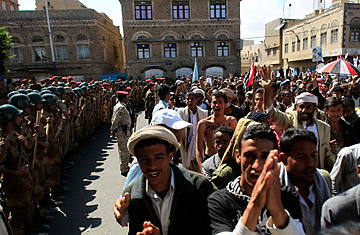
Yemeni protesters walk past soldiers loyal to President Ali Abdullah Saleh as they march to demand his trial in Sana'a on Nov. 27, 2011
(2 of 2)
So far, the deal has altered little on the ground. Mass protests have erupted in towns and cities across Yemen in response to the signing. Cries of "The revolution continues" and "No immunity for the murderers" now echo daily through the winding alleyways of Sana'a. On Thursday, just a day after the agreement was signed, a mob of Kalashnikov-wielding plainclothes government thugs, or balaatija as the protesters call them, picked off five demonstrators with their guns from a rooftop and maimed a further 30 as they stormed through the streets of Sana'a calling for Saleh to be put on trial.
A date for presidential elections has been proposed for Feb. 21. If they go ahead, they will be the first elections in unified Yemen's 21-year history that don't feature Saleh as a candidate. But rather than a triumph of democracy, the elections appear to be little more than a rubber stamp, a mechanism for the elites to reach a political consensus. Voters will likely only get the chance to elect one candidate — the Vice President — and won't get the chance to exercise their vote again until parliamentary elections, which aren't expected for another two years. Protesters have already voiced opposition to the elections, claiming them to be a farce. They are also threatening to burn their electoral ID cards if Saleh's family aren't removed from positions of power.
But, with Saleh supposedly out of the picture, attention is quickly shifting from the street to the political elite. Yemen's formal opposition coalition, the JMP, a motley assortment of socialists, Sunni Islamists and Baathists who for years were shut out of the political process by Saleh's all-powerful ruling party, now find themselves entering into a government of national unity with their old rivals.
On Sunday, their favored candidate, a 78-year-old veteran of South Yemen's struggle for independence from Britain, Mohammed Basindwa, was appointed Prime Minister. In the coming days they will gain substantial parliamentary representation as the country's ministerial offices are divvied out between the two. But if Saleh — who declared a general amnesty on Sunday for people who had committed "follies" during the uprising — continues to behave like President, there is a real risk that the fragile coalition will unravel.
The JMP's new rapport with Saleh's party is already costing them popularity. A rift has developed between the highly organized Islamic Islah party, which dominate the JMP, and the nonpartisan youth who first laid their tents in Change Square back in January. The youth accuse the opposition of hijacking their revolution and betraying them by signing the deal that grants Saleh immunity. Speakers from the Islah party were sent diving for cover last Thursday when a group of youth launched a coordinated attack on the main stage in Change Square, pelting it with stones, eggs and plastic bottles, shouting: "Our stage, our revolution, down with the opposition!"
Meanwhile, Yemenis are waiting nervously to see how Saleh's chief rivals, Major General Ali Mohsen, an old confidant of the President who defected in March, and the powerful al-Ahmar clan respond to the violence. For months now, the sandbagged streets of downtown Sana'a have been the scene of running street battles as the Republican Guard — an elite force headed by Saleh's son Ahmed — fight with the well-armed supporters of the general and the Ahmars, who lead the country's most powerful tribal federation. Getting Saleh to sign may have been the easiest Yemeni problem to solve.
